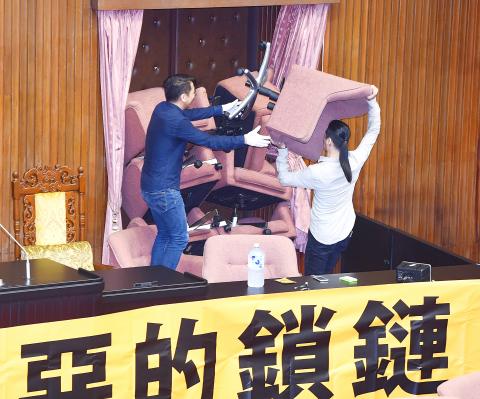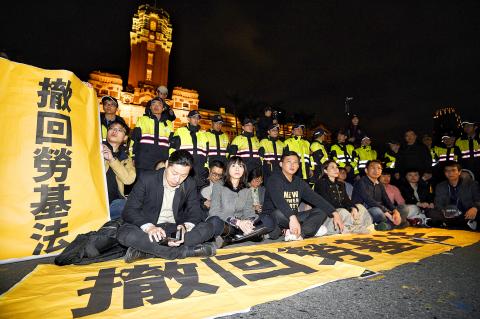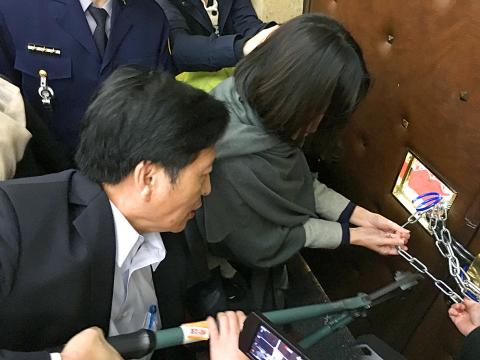Five New Power Party (NPP) legislators yesterday began a hunger strike in front of the Presidential Office Building in Taipei, calling on President Tsai Ing-wen (蔡英文), in her capacity as Democratic Progressive Party (DPP) chairperson, to order the DPP caucus to retract draft amendments to the Labor Standards Act (勞動基準法) from bills to be reviewed during an extraordinary legislative session that began yesterday.
As of press time last night, Tsai had not met with the NPP lawmakers, who said they would not leave until she issues a response in person.
Holding a banner that read: “Retract the Labor Standards Act,” NPP Executive Chairman Huang Kuo-chang (黃國昌), NPP caucus convener Hsu Yung-ming (徐永明) and NPP legislators Kawlo Iyun Pacidal, Hung Tsu-yung (洪慈庸) and Freddy Lim (林昶佐) in the afternoon marched from the Legislative Yuan to Ketagalan Boulevard, where they sat down and began the hunger strike at about 6:15pm.

Photo: Liao Chen-huei, Taipei Times
“In a bid to exercise the [DPP’s] will, the government wants to pander to corporations and ignore workers’ rights and the future of young people,” Huang said. “As the person who should bear the greatest responsibility for this, President and Chairperson Tsai, please tell us why in the 2016 election you promised to protect workers’ rights, but now you have assembled a ‘voting army’ in an attempt to push through labor amendments that are opposed by the large majority of workers and young people.”
The results of a Ministry of Labor survey “were a slap in its own face and exposed its sugarcoated lies,” Huang said, referring to a survey released by the ministry last week which found that 48.2 percent of workers were against raising the monthly overtime cap and 58.4 percent were against offering employers the option to tweak the “one fixed day off and one flexible rest day” workweek policy.
The legislators would not leave until Tsai offers an explanation to all workers and young people, many of whom are paid low wages, he said.

Photo: Chen Chih-chu, Taipei Times
The move came after Democratic Progressive Party (DPP) lawmakers entered the legislative chamber and surrounded the NPP members, who had occupied the speaker’s podium.
The NPP lawmakers then announced that they would march to the Presidential Office Building in the hope of blocking the passage of the bill.
Earlier yesterday, Hsu shattered windows in the doors of the legislative chamber, which he sealed with chain locks to protest the DPP caucus sending the draft amendments to the extraordinary session via a majority vote.

Photo: Cheng Hung-ta, Taipei Times
DPP lawmakers then cut through the chains with a hydraulic cutter and entered the chamber.
About an hour into the NPP’s sit-in, Presidential Office spokesman Sidney Lin (林鶴明) said in a statement that relevant agencies were gauging public opinion and determining how the act could be amended to best fit the needs of businesses and workers.
The draft amendments are being reviewed at the legislature and the five lawmakers should return to rational discussions in line with legislative procedure, Lin said.
Huang criticized the office’s response, asking whether Lin was ignorant of the progress of the amendments.
He said Lin’s remark that agencies are gathering public opinion was preposterous, and highlighted the recklessness and incompetence of the legislative process, as the passage of the draft amendments was expected imminently.
The office’s release of such a perfunctory statement without first putting events into perspective was “completely unacceptable,” Huang said.

The Ministry of Foreign Affairs (MOFA) yesterday said it is closely monitoring developments in Venezuela, and would continue to cooperate with democratic allies and work together for regional and global security, stability, and prosperity. The remarks came after the US on Saturday launched a series of airstrikes in Venezuela and kidnapped Venezuelan President Nicolas Maduro, who was later flown to New York along with his wife. The pair face US charges related to drug trafficking and alleged cooperation with gangs designated as terrorist organizations. Maduro has denied the allegations. The ministry said that it is closely monitoring the political and economic situation

Conflict with Taiwan could leave China with “massive economic disruption, catastrophic military losses, significant social unrest, and devastating sanctions,” a US think tank said in a report released on Monday. The German Marshall Fund released a report titled If China Attacks Taiwan: The Consequences for China of “Minor Conflict” and “Major War” Scenarios. The report details the “massive” economic, military, social and international costs to China in the event of a minor conflict or major war with Taiwan, estimating that the Chinese People’s Liberation Army (PLA) could sustain losses of more than half of its active-duty ground forces, including 100,000 troops. Understanding Chinese

UNRELENTING: China attempted cyberattacks on Taiwan’s critical infrastructure 2.63 million times per day last year, up from 1.23 million in 2023, the NSB said China’s cyberarmy has long engaged in cyberattacks against Taiwan’s critical infrastructure, employing diverse and evolving tactics, the National Security Bureau (NSB) said yesterday, adding that cyberattacks on critical energy infrastructure last year increased 10-fold compared with the previous year. The NSB yesterday released a report titled Analysis on China’s Cyber Threats to Taiwan’s Critical Infrastructure in 2025, outlining the number of cyberattacks, major tactics and hacker groups. Taiwan’s national intelligence community identified a large number of cybersecurity incidents last year, the bureau said in a statement. China’s cyberarmy last year launched an average of 2.63 million intrusion attempts per day targeting Taiwan’s critical

‘SLICING METHOD’: In the event of a blockade, the China Coast Guard would intercept Taiwanese ships while its navy would seek to deter foreign intervention China’s military drills around Taiwan this week signaled potential strategies to cut the nation off from energy supplies and foreign military assistance, a US think tank report said. The Chinese People’s Liberation Army (PLA) conducted what it called “Justice Mission 2025” exercises from Monday to Tuesday in five maritime zones and airspace around Taiwan, calling them a warning to “Taiwanese independence” forces. In a report released on Wednesday, the Institute for the Study of War said the exercises effectively simulated blocking shipping routes to major port cities, including Kaohsiung, Keelung and Hualien. Taiwan would be highly vulnerable under such a blockade, because it